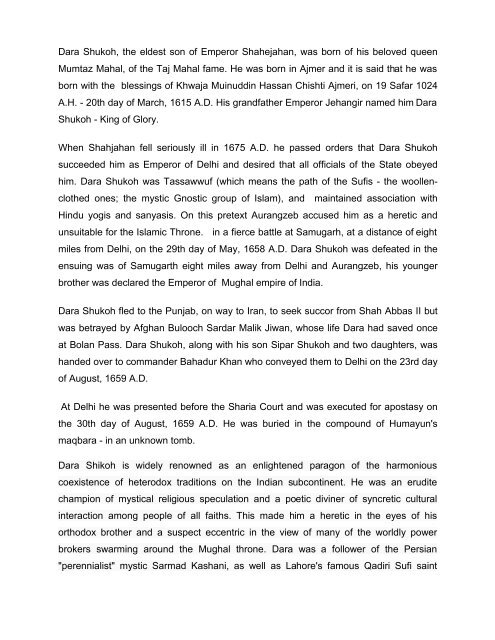KathaUpanishad
Create successful ePaper yourself
Turn your PDF publications into a flip-book with our unique Google optimized e-Paper software.
Dara Shukoh, the eldest son of Emperor Shahejahan, was born of his beloved queen<br />
Mumtaz Mahal, of the Taj Mahal fame. He was born in Ajmer and it is said that he was<br />
born with the blessings of Khwaja Muinuddin Hassan Chishti Ajmeri, on 19 Safar 1024<br />
A.H. - 20th day of March, 1615 A.D. His grandfather Emperor Jehangir named him Dara<br />
Shukoh - King of Glory.<br />
When Shahjahan fell seriously ill in 1675 A.D. he passed orders that Dara Shukoh<br />
succeeded him as Emperor of Delhi and desired that all officials of the State obeyed<br />
him. Dara Shukoh was Tassawwuf (which means the path of the Sufis - the woollenclothed<br />
ones; the mystic Gnostic group of Islam), and maintained association with<br />
Hindu yogis and sanyasis. On this pretext Aurangzeb accused him as a heretic and<br />
unsuitable for the Islamic Throne. in a fierce battle at Samugarh, at a distance of eight<br />
miles from Delhi, on the 29th day of May, 1658 A.D. Dara Shukoh was defeated in the<br />
ensuing was of Samugarth eight miles away from Delhi and Aurangzeb, his younger<br />
brother was declared the Emperor of Mughal empire of India.<br />
Dara Shukoh fled to the Punjab, on way to Iran, to seek succor from Shah Abbas II but<br />
was betrayed by Afghan Bulooch Sardar Malik Jiwan, whose life Dara had saved once<br />
at Bolan Pass. Dara Shukoh, along with his son Sipar Shukoh and two daughters, was<br />
handed over to commander Bahadur Khan who conveyed them to Delhi on the 23rd day<br />
of August, 1659 A.D.<br />
At Delhi he was presented before the Sharia Court and was executed for apostasy on<br />
the 30th day of August, 1659 A.D. He was buried in the compound of Humayun's<br />
maqbara - in an unknown tomb.<br />
Dara Shikoh is widely renowned as an enlightened paragon of the harmonious<br />
coexistence of heterodox traditions on the Indian subcontinent. He was an erudite<br />
champion of mystical religious speculation and a poetic diviner of syncretic cultural<br />
interaction among people of all faiths. This made him a heretic in the eyes of his<br />
orthodox brother and a suspect eccentric in the view of many of the worldly power<br />
brokers swarming around the Mughal throne. Dara was a follower of the Persian<br />
"perennialist" mystic Sarmad Kashani, as well as Lahore's famous Qadiri Sufi saint


















